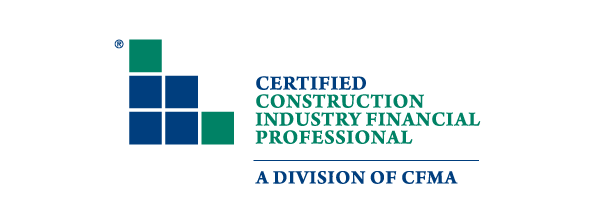|

A recent interview with Chris Zaucha, Executive Director of ICCIFP, perfectly describes the value proposition for earning your CCIFP designation. Chris is a former construction owner, CFO, and controller and now directs the ICCIFP - the industry’s only certification for construction financial managers.
What is the purpose of the ICCIFP?
The Institute of Certified Construction Industry Financial Professionals (ICCIFP) provides the construction industry with a third-party verification of an individual’s knowledge, which is essential to ethical financial management in today’s complex construction industry. The ICCIFP is the only professional organization offering a certification focused solely on the unique construction financial management body of knowledge. The organization is accredited by the American National Standards Institute (ANSI) under ISO 17024:2012.
What types of accounting and financial concepts and information are unique to the construction industry? [In other words, why can’t just any regular accounting person come in and handle construction projects?]
Long gone are the days where accountants focused only on the numbers. Today’s construction CFOs and controllers are involved with every aspect of financial and operations management. A conventional accountant has little to no experience dealing with work-in-progress schedules, complex revenue recognition rules specific to construction, certified payrolls, sureties and risk management, workers’ comp, etc. Construction accounting is truly unique and has different standards related to revenue, expenses, gross profit recognition, etc.
What is the value of having the CCIFP designation?
Much like contractors and hoisters acquiring the necessary knowledge to achieve certification, the CCIFP designation demonstrates an individual has met a nationally recognized standard and may now be pre-qualified as a competent construction financial manager. A CCIFP has voluntarily met the required certification criteria regarding education, experience, and demonstrated understanding of the industry’s body of knowledge. In addition, CCIFPs are required to adhere to a code of ethics – as high as any other profession on which businesses and the public rely.
What kinds of ramifications or consequences might there be for allowing an unqualified financial professional working on a construction project or team?
You wouldn’t hire a contractor, hoister, architect, or engineer without the proper certifications and credentials. Your project managers and field personnel are likely certified with OSHA safety standards. Why would you hire someone to control the most important part of the project – its finances – without the proper credential? A CCIFP has met rigorous standards and keeps current with all financial requirements. You already have enough to worry about in terms of project execution. Wondering if your CFO or controller is qualified to perform shouldn’t add to that list.
Who is eligible to become a CCIFP?
Candidates who have earned a bachelor’s degree or higher with at least 12 business credits are eligible to apply after reaching 4,000 hours of experience in the construction finance field within the last 5 years. Those without a bachelor’s degree may substitute 4 years of construction-finance experience in addition to 4,000 hours within the last 5 years.
What are some of the typical categories or areas of study related to becoming a CCIFP that tend to require more effort to learn and master?
Accounting and Reporting, Income Recognition Methods, Budgeting and Planning, and Risk Management tend to be the categories requiring more effort to master and account for 75% of the exam. The remaining categories of Taxes, Human Resources, Legal, and Information Technology also require an adequate amount of time to learn thoroughly. Click here and watch our “Am I Certifiable?” video for more information.
How frequently do CCIFPs update their learning based on legislative, regulatory, or tax changes?
CCIFPs are required to submit a minimum of 72 continuing education credits every three years with at least 48 credits classified as construction finance. Most CCIFPs regularly attend annual conferences and workshops offering topics focused on tax and legal updates.
How important will the presence of a CCIFP be on future construction projects?
A CCIFP on future projects offers and added layer of assurance that your project team is professional, ethical, and has met a nationally accredited standard. It provides peace of mind that the project’s finances are being managed effectively and efficiently by a certified professional. For a complete listing of CCIFPs, click here.
_______________________________________________________________________________________________________________________
The CCIFP designation is ANSI-accredited (ISO 17024:2012) and still the industry’s only certification focused solely on the unique construction financial management body of knowledge. Individuals who earn the coveted CCIFP designation receive third-party verification of their competency in accounting and reporting, income recognition methods and six additional knowledge domains directly related to construction.
Here are some quick links to answer your FAQs:
Download our white paper "What to look for in a construction CPA firm" to see how your firm compares to the top firms with construction practices and, for contractors, to determine if you have the best business partner available. Click here to see firms that have construction practices with CCIFPs on staff.
|

